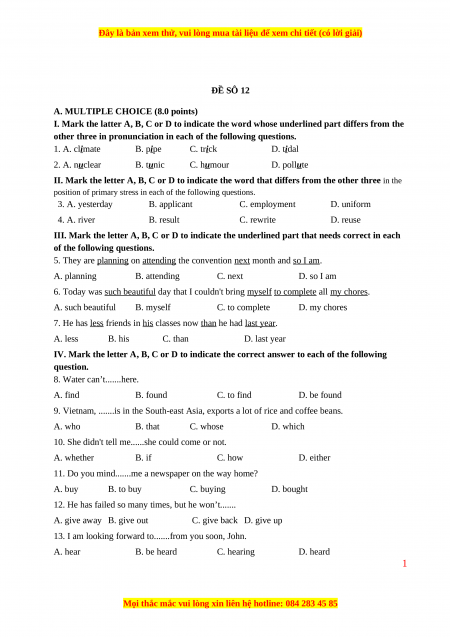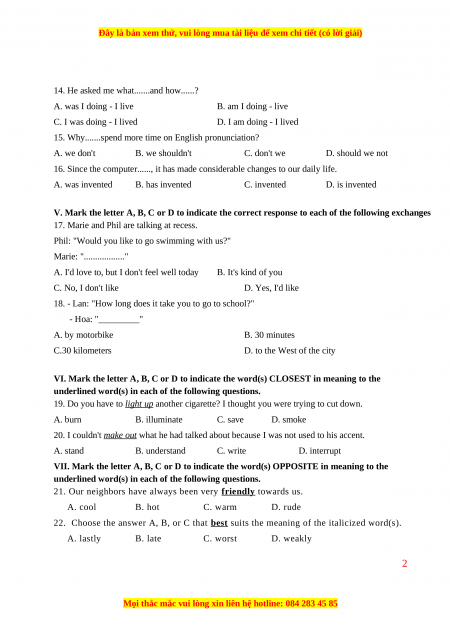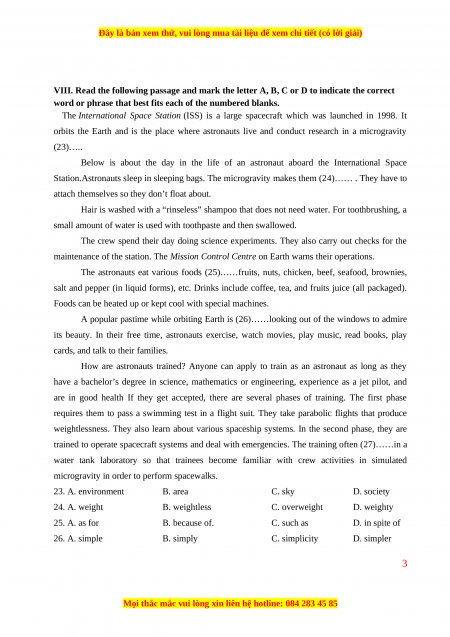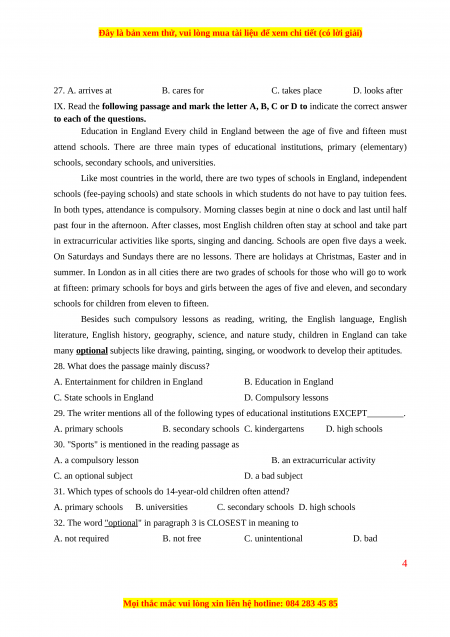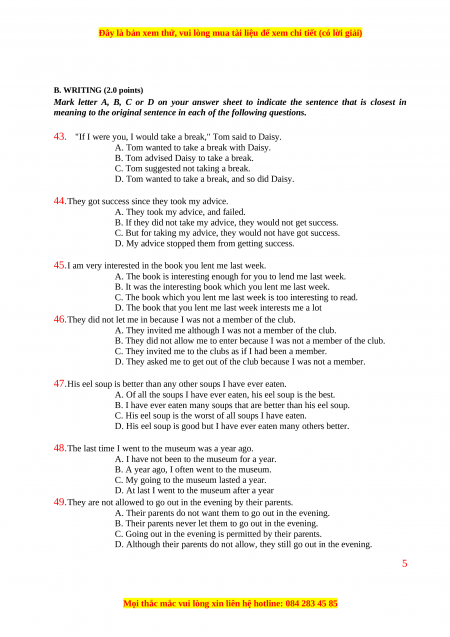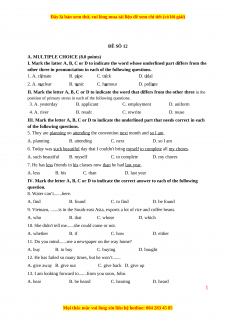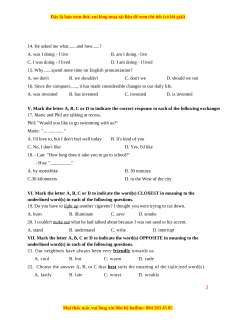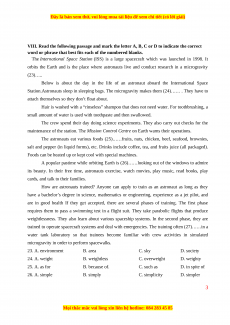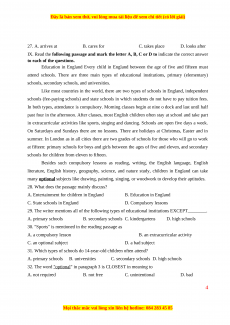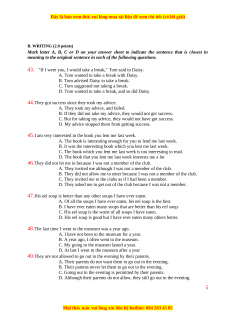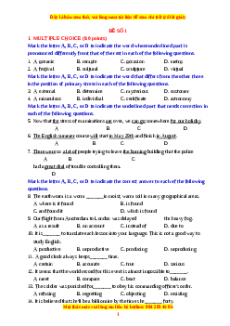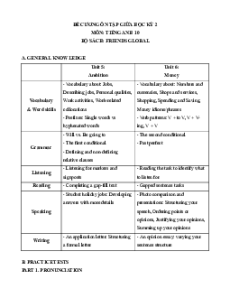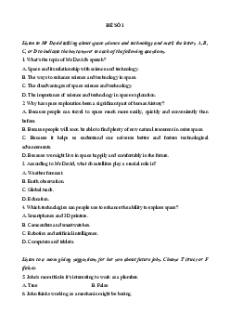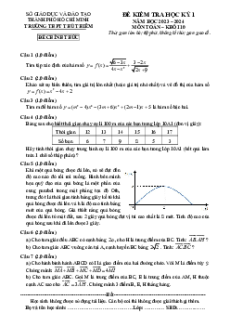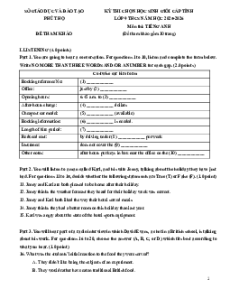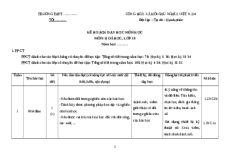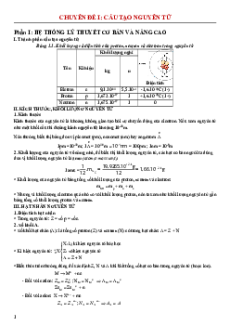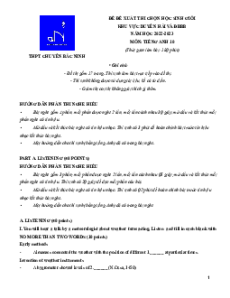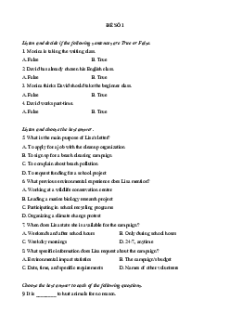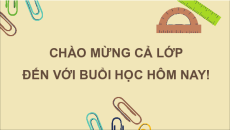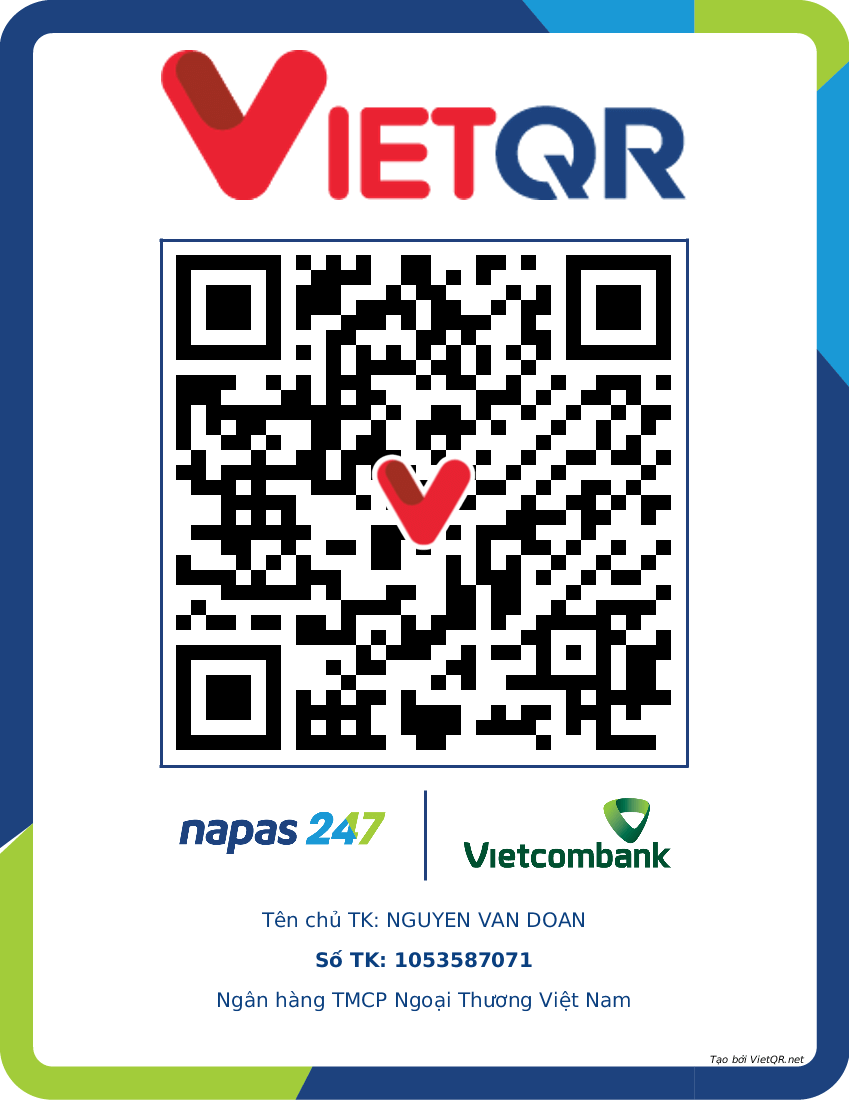ĐỀ SÔ 12
A. MULTIPLE CHOICE (8.0 points)
I. Mark the latter A, B, C or D to indicate the word whose underlined part differs from the
other three in pronunciation in each of the following questions.
1. A. climate B. pipe C. trick D. tidal 2. A. nuclear B. tunic C. humour D. pollute
II. Mark the letter A, B, C or D to indicate the word that differs from the other three in the
position of primary stress in each of the following questions. 3. A. yesterday B. applicant C. employment D. uniform 4. A. river B. result C. rewrite D. reuse
III. Mark the letter A, B, C or D to indicate the underlined part that needs correct in each of the following questions.
5. They are planning on attending the convention next month and so I am. A. planning B. attending C. next D. so I am
6. Today was such beautiful day that I couldn't bring myself to complete all my chores. A. such beautiful B. myself C. to complete D. my chores
7. He has less friends in his classes now than he had last year. A. less B. his C. than D. last year
IV. Mark the letter A, B, C or D to indicate the correct answer to each of the following question.
8. Water can’t.......here. A. find B. found C. to find D. be found
9. Vietnam, .......is in the South-east Asia, exports a lot of rice and coffee beans. A. who B. that C. whose D. which
10. She didn't tell me......she could come or not. A. whether B. if C. how D. either
11. Do you mind.......me a newspaper on the way home? A. buy B. to buy C. buying D. bought
12. He has failed so many times, but he won’t....... A. give away B. give out C. give back D. give up
13. I am looking forward to.......from you soon, John. A. hear B. be heard C. hearing D. heard 1
14. He asked me what.......and how......? A. was I doing - I live B. am I doing - live C. I was doing - I lived D. I am doing - I lived
15. Why.......spend more time on English pronunciation? A. we don't B. we shouldn't C. don't we D. should we not
16. Since the computer......, it has made considerable changes to our daily life. A. was invented B. has invented C. invented D. is invented
V. Mark the letter A, B, C or D to indicate the correct response to each of the following exchanges
17. Marie and Phil are talking at recess.
Phil: "Would you like to go swimming with us?" Marie: ".................."
A. I'd love to, but I don't feel well today B. It's kind of you C. No, I don't like D. Yes, I'd like
18. - Lan: "How long does it take you to go to school?" - Hoa: "_________" A. by motorbike B. 30 minutes C.30 kilometers D. to the West of the city
VI. Mark the letter A, B, C or D to indicate the word(s) CLOSEST in meaning to the
underlined word(s) in each of the following questions.
19. Do you have to light up another cigarette? I thought you were trying to cut down. A. burn B. illuminate C. save D. smoke
20. I couldn't make out what he had talked about because I was not used to his accent. A. stand B. understand C. write D. interrupt
VII. Mark the letter A, B, C or D to indicate the word(s) OPPOSITE in meaning to the
underlined word(s) in each of the following questions.
21. Our neighbors have always been very friendly towards us. A. cool B. hot C. warm D. rude
22. Choose the answer A, B, or C that best suits the meaning of the italicized word(s). A. lastly B. late C. worst D. weakly 2
VIII. Read the following passage and mark the letter A, B, C or D to indicate the correct
word or phrase that best fits each of the numbered blanks.
The International Space Station (ISS) is a large spacecraft which was launched in 1998. It
orbits the Earth and is the place where astronauts live and conduct research in a microgravity (23)…..
Below is about the day in the life of an astronaut aboard the International Space
Station.Astronauts sleep in sleeping bags. The microgravity makes them (24)…… . They have to
attach themselves so they don’t float about.
Hair is washed with a “rinseless” shampoo that does not need water. For toothbrushing, a
small amount of water is used with toothpaste and then swallowed.
The crew spend their day doing science experiments. They also carry out checks for the
maintenance of the station. The Mission Control Centre on Earth warns their operations.
The astronauts eat various foods (25)……fruits, nuts, chicken, beef, seafood, brownies,
salt and pepper (in liquid forms), etc. Drinks include coffee, tea, and fruits juice (all packaged).
Foods can be heated up or kept cool with special machines.
A popular pastime while orbiting Earth is (26)……looking out of the windows to admire
its beauty. In their free time, astronauts exercise, watch movies, play music, read books, play
cards, and talk to their families.
How are astronauts trained? Anyone can apply to train as an astronaut as long as they
have a bachelor’s degree in science, mathematics or engineering, experience as a jet pilot, and
are in good health If they get accepted, there are several phases of training. The first phase
requires them to pass a swimming test in a flight suit. They take parabolic flights that produce
weightlessness. They also learn about various spaceship systems. In the second phase, they are
trained to operate spacecraft systems and deal with emergencies. The training often (27)……in a
water tank laboratory so that trainees become familiar with crew activities in simulated
microgravity in order to perform spacewalks. 23. A. environment B. area C. sky D. society 24. A. weight B. weightless C. overweight D. weighty
25. A. as for B. because of. C. such as D. in spite of 26. A. simple B. simply C. simplicity D. simpler 3
27. A. arrives at B. cares for C. takes place D. looks after
IX. Read the following passage and mark the letter A, B, C or D to indicate the correct answer
to each of the questions.
Education in England Every child in England between the age of five and fifteen must
attend schools. There are three main types of educational institutions, primary (elementary)
schools, secondary schools, and universities.
Like most countries in the world, there are two types of schools in England, independent
schools (fee-paying schools) and state schools in which students do not have to pay tuition fees.
In both types, attendance is compulsory. Morning classes begin at nine o dock and last until half
past four in the afternoon. After classes, most English children often stay at school and take part
in extracurricular activities like sports, singing and dancing. Schools are open five days a week.
On Saturdays and Sundays there are no lessons. There are holidays at Christmas, Easter and in
summer. In London as in all cities there are two grades of schools for those who will go to work
at fifteen: primary schools for boys and girls between the ages of five and eleven, and secondary
schools for children from eleven to fifteen.
Besides such compulsory lessons as reading, writing, the English language, English
literature, English history, geography, science, and nature study, children in England can take
many optional subjects like drawing, painting, singing, or woodwork to develop their aptitudes.
28. What does the passage mainly discuss?
A. Entertainment for children in England B. Education in England C. State schools in England D. Compulsory lessons
29. The writer mentions all of the following types of educational institutions EXCEPT________. A. primary schools
B. secondary schools C. kindergartens D. high schools
30. "Sports" is mentioned in the reading passage as A. a compulsory lesson B. an extracurricular activity C. an optional subject D. a bad subject
31. Which types of schools do 14-year-old children often attend? A. primary schools B. universities
C. secondary schools D. high schools
32. The word "optional" in paragraph 3 is CLOSEST in meaning to A. not required B. not free C. unintentional D. bad 4
Đề thi trắc nghiệm Tiếng anh 10 năm 2022 - 2023 (Đề 12)
777
389 lượt tải
MUA NGAY ĐỂ XEM TOÀN BỘ TÀI LIỆU
CÁCH MUA:
- B1: Gửi phí vào TK:
1133836868- CT TNHH DAU TU VA DV GD VIETJACK - Ngân hàng MB (QR) - B2: Nhắn tin tới Zalo VietJack Official ( nhấn vào đây ) để xác nhận thanh toán và tải tài liệu - giáo án
Liên hệ ngay Hotline hỗ trợ: 084 283 45 85
Đề thi được cập nhật liên tục trong gói này từ nay đến hết tháng 6/2023. Chúng tôi đảm bảo đủ số lượng đề đã cam kết hoặc có thể nhiều hơn, tất cả có BẢN WORD, LỜI GIẢI CHI TIẾT và tải về dễ dàng.
Để tải tài liệu gốc về máy bạn click vào nút Tải Xuống ở trên!
Thuộc bộ (mua theo bộ để tiết kiệm hơn):
- Tailieugiaovien.com.vn giới thiệu bộ 19 đề thi trắc nghiệm Tiếng anh 10 mới nhất năm 2022 - 2023 nhằm giúp Giáo viên có thêm tài liệu tham khảo ra đề thi Tiếng Anh lớp 10.
- File word có lời giải chi tiết 100%.
- Mua trọn bộ sẽ tiết kiệm hơn tải lẻ 50%.
Đánh giá
4.6 / 5(777 )5
4
3
2
1
Trọng Bình
Tài liệu hay
Giúp ích cho tôi rất nhiều
Duy Trần
Tài liệu chuẩn
Rất thích tài liệu bên VJ soạn (bám sát chương trình dạy)
